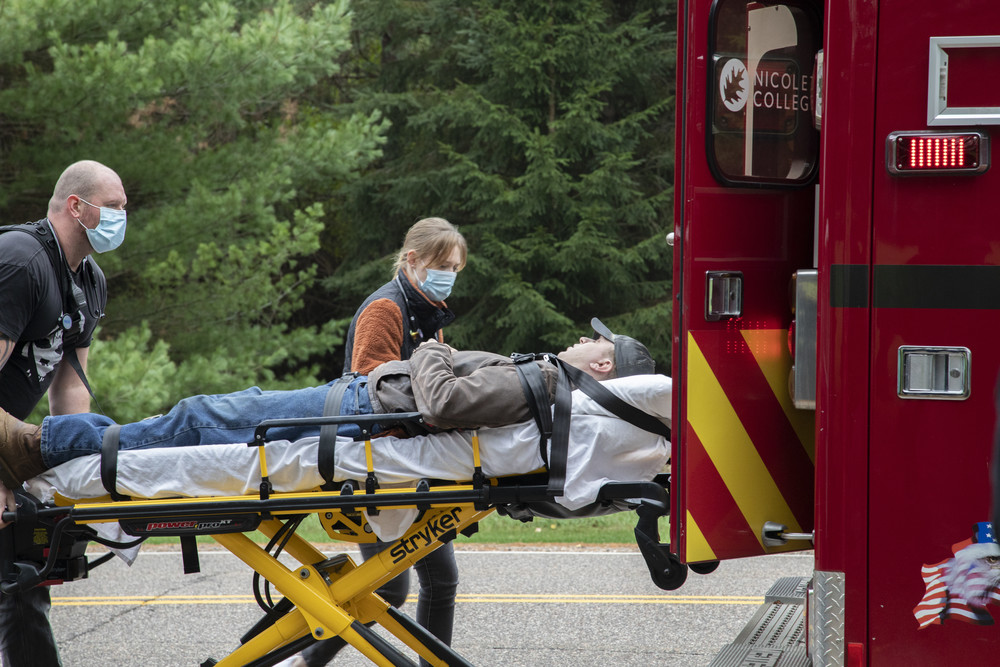

Large-scale Emergency Training Exercise Enhances Skills for Students Entering Many Professions
In an emergency, several professions often must work together quickly and efficiently in order to provide the services necessary to ensure the safety and positive outcome for all involved.
That was the goal of a recent real-world simulation exercise at Nicolet College and funded by the Wisconsin Northern Highland Area Health Education Center that brought together students from the Law Enforcement, Emergency Medical Services, and Nursing programs along with representatives from the Human Services field.
“These students don’t really get to interact that much when they are on campus, so we wanted to create an exercise where they all had to work together in a professional capacity,” said Nicolet Nursing Instructor Dilya St. Louis, who led the coordination of the simulation.
“After these students graduate and start their careers, it will be common for them to work with others from different professions. We wanted to give them that experience, to interact with each other and for all of them to practice the specialized skills they’ve learned in Nicolet labs and classrooms.”
The first-of-its-kind training scenario for the college started with a staged 911 call to alert authorities of a man acting strangely out in the Field on campus.
Law Enforcement students responded to the scene to assess the situation, make initial contact with the individual in distress, and to ensure conditions were safe and secure for EMS students to arrive on-scene.
But there was a twist.
Nicolet Law Enforcement student Jeremy Irish was first to arrive.
“When I got on there and walked up to him, I could see the individual had a knife, which really surprised me,” Irish said. “I wasn’t prepared for that.”
But then his Nicolet training kicked in and he was able to deescalate the situation and make it safe for EMS students to practice their skills.
Determining the individual was suicidal and highly intoxicated on alcohol and prescription drugs, the EMS students decided he needed a higher level of care. After stabilizing the now patient, they transported him by ambulance to “Nicolet Hospital,” otherwise known as the Nursing Lab.
Once there, Nicolet Nursing students took over providing care. The simulation ended after substance abuse crisis professionals did their evaluation and determined a long-term care plan.
“At each stage of care the students from one academic program had to coordinate and communicate with students from a different program each time the patient went to the next stage of the scenario,” St. Louis said.
“Over the years we’ve noticed that while the students have solid technical skills, there can be a skills gap in effective communication with others. We wanted to put them in a situation where they had to communicate with people outside of their profession, and I have to say they all did great. It got them out of their comfort zone and they learned new skills.”
The drill also gave students the opportunity to gain experience treating a suicidal individual.
“Dealing with people with mental illness is very challenging and students commonly receive little if any training in this area,” said St. Louis, who previously worked as an emergency room nurse in Rhinelander.
“Almost daily we had someone who was suicidal in the emergency room. It’s much more common than many people think. It’s a real problem and something that these students are going to have to respond to and deal with.”
Law Enforcement student Irish said the multi-disciplinary aspect of the simulation was a “great” learning experience.
“It was the first time that I’ve had a scenario that we were able to bring in all the different parties here at Nicolet College,” said Irish. “They really made it seem like we were all responding to a real emergency, which was invaluable.”
According to Gail Kell, the executive director of Wisconsin Northern Highland Area Health Education Center, the organization is working on plans to fund another simulation in the spring of 2021.